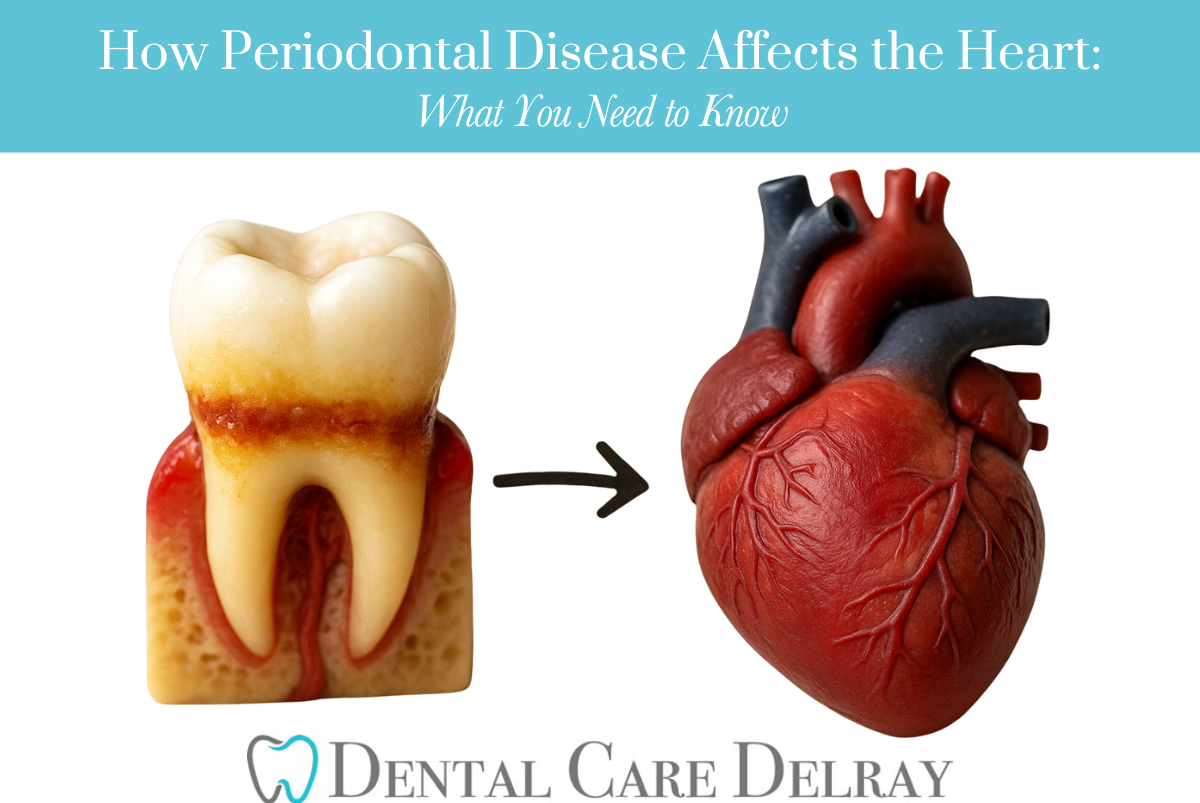At Dental Care Delray, we care about more than just your smile—we care about your overall health. One of the most important yet often overlooked connections in healthcare is the link between periodontal (gum) disease and heart disease. While these may seem like two unrelated conditions, research continues to show that the health of your gums can significantly influence your cardiovascular health.
In this post, we’ll explore how gum disease develops, how it affects the heart, and what steps you can take to protect both your smile and your heart.
What Is Periodontal Disease?
Periodontal disease is a chronic inflammatory condition that affects the gums and bone that support your teeth. It begins with plaque buildup and can progress through the following stages:
- Gingivitis: Early-stage gum disease characterized by red, swollen, and bleeding gums.
- Periodontitis: Advanced gum disease where the infection reaches the bone, leading to gum recession, tooth mobility, and even tooth loss.
Gum disease is caused by harmful bacteria in dental plaque that trigger the body’s inflammatory response. If left untreated, it can lead to irreversible damage to the gums and jawbone.
The Mouth-Heart Connection
So, how does a disease in your mouth impact your heart?
Inflammation Is the Common Link
Both periodontal disease and heart disease involve chronic inflammation. When your gums are infected, your body produces an inflammatory response that can spill over into your bloodstream. This inflammation may contribute to:
- Atherosclerosis (hardening of the arteries)
- Increased risk of blood clots
- Elevated blood pressure
- Strain on the cardiovascular system
Bacteria Entering the Bloodstream
The bacteria that cause gum disease can enter your bloodstream through inflamed or bleeding gums. Once in the bloodstream, they may:
- Trigger inflammation in blood vessels
- Contribute to the formation of arterial plaque
- Increase the risk of heart attack and stroke
In fact, studies have found that people with periodontal disease are up to 2–3 times more likely to have a heart attack, stroke, or other serious cardiovascular events.
Protecting Your Oral and Heart Health
At Dental Care Delray, we emphasize preventive care to safeguard both your oral and systemic health. Here’s how you can reduce your risk:
- Brush and floss daily to remove plaque and food debris.
- Visit your dentist regularly for cleanings and checkups.
- Stop smoking, as it significantly increases the risk of both gum disease and heart problems.
- Eat a heart-healthy diet rich in vegetables, fruits, lean proteins, and whole grains.
- Manage underlying conditions like diabetes and hypertension, which are risk factors for both periodontal and cardiovascular disease.
If you’re already diagnosed with heart disease, let your dental team know—your oral care may need to be adjusted to reduce the risk of bacterial spread or complications during dental procedures.
Q&A: Periodontal Disease and Heart Health
Q: Can treating gum disease improve heart health?
A: While treating gum disease is not a cure for heart disease, it can reduce inflammation in the body and lower the bacterial load in the bloodstream, potentially decreasing cardiovascular risk.
Q: Are people with heart disease more prone to gum disease?
A: Yes, certain cardiovascular conditions and medications can make gum tissues more susceptible to inflammation or bleeding, increasing the risk of periodontal disease.
Q: How do I know if I have gum disease?
A: Common symptoms include bleeding gums, bad breath, receding gums, loose teeth, and tooth sensitivity. If you experience any of these, schedule an exam with us promptly.
Q: Should I take antibiotics before dental work if I have heart issues?
A: In some cases, such as with artificial heart valves or a history of endocarditis, your physician or dentist may recommend antibiotics prior to treatment. Always share your full medical history with us.
Q: Is gum disease reversible?
A: Gingivitis, the early stage, is reversible with professional care and good home hygiene. However, once it progresses to periodontitis, the damage may be permanent but can be managed with ongoing treatment.
Your Smile and Your Heart Are Connected
At Dental Care Delray, our team is here to help you maintain not just a healthy smile but a healthier you. We offer comprehensive periodontal evaluations, advanced gum treatments, and personalized prevention plans.
Don’t wait until symptoms appear—early detection is key to protecting your oral and heart health.
Contact Us
Dental Care Delray
📍 5130 Linton Blvd # D2
📍 Delray Beach, FL 33484
📞 Phone: (561) 496-2222
🌐 dentalcaredelray.com
Book your appointment today and take the first step toward a healthier mouth—and heart.

